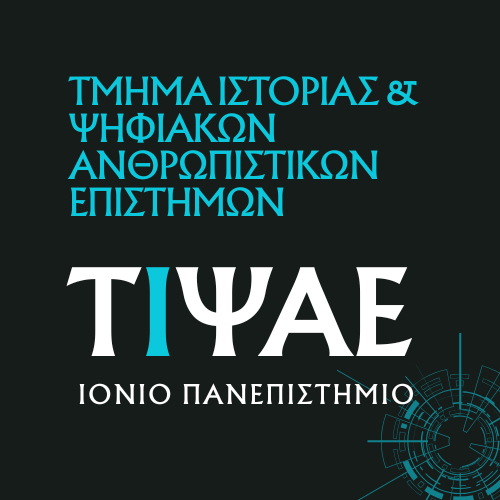Teaching Staff: Baroutsos Fotios, Evangelou Gabriel
Course Code: ΙΜΕ607
Course Type: Seminar
Course Level: Undergraduate
Course Language: Greek
Semester: 7th
ECTS: 5
E Class Page: https://opencourses.ionio.gr/courses/DHI413/
Curricula: Curriculum in History up to 2024-25, Curriculum in History and Digital Humanities from 2025
Analysis of selected translated passages from the corpus of Cicero’s works, highlighting his rhetorical mastery, the variety of literary genres he cultivated, and above all their historical value, as they provide readers with insight into the functioning of the legislative, executive, and judicial powers of Rome during the first century BCE.
Connection between the literature produced between 1300 and 1550 and classical Roman literary production, through the analysis of texts by Petrarch and Machiavelli and the study of republican states in relation to political theories based on writings from the Roman Republican period.
By the end of the course, students will have:
-
An overview of how ideas evolve within different historical and cultural frameworks, thus changing in meaning and significance.
-
Knowledge of the authors, ideas, and historical contexts in which these ideas developed.
-
Familiarity with methods of studying texts from both Antiquity and the Renaissance.
In addition, students will be able to:
-
Understand in depth the fundamental principles that defined the late Respublica Romana and the roles played by prominent figures such as Cicero, Pompey, and Caesar in Augustus’ rise and the establishment of the Empire.
-
Identify the main powers and responsibilities of Rome’s principal governing institutions.
-
Recognise rhetorical techniques in ancient and modern texts and apply them effectively in argumentation.
-
Distinguish between the various genres of Latin literature and understand why authors chose particular forms for specific purposes.
-
Differentiate between an author as a historical individual and the public persona he constructs through his writings.
-
Use digital tools to access Latin and Italian texts and their translations.
-
Identify key concepts and phenomena of the Renaissance movement.
-
Situate scholars of Roman classics within the broader framework of reconnection with Antiquity.
-
Contextualise authors and ideas within the wider evolution of intellectual history.
-
Distinguish between the principal forms of government, namely republicanism and monarchy.
-
Appreciate the intellectual and historical significance of authors such as Petrarch and Niccolò Machiavelli.
Throughout the semester, the following topics will be examined:
A. Introduction to the life and works of Cicero during the final decades of the Respublica Romana.
B. The distinct nature of the consulship, through an analysis of selected passages from Cicero’s political speech In Catilinam.
C. The particular role of the Senate as an advisory body in the so-called Roman Republic, through the reading of selected excerpts from Cicero’s speech delivered before the senators, Post Reditum in Senatu.
D. The use of (auto)biography as a means of self-praise in Roman politics, as illustrated in Cicero’s letter to the historian Lucceius (Fam. 5.12).
E. The presence of Greek philosophy in ancient Rome—especially within the political sphere—through the study of passages from Cicero’s philosophical treatise De oratore.
F. Forensic oratory as a vehicle for political advancement in first-century BCE Rome: analysis of Cicero’s defence of the Roman politician Milo (Pro Milone).
G. The use of invective in Roman political life: Cicero’s Second Philippic against Mark Antony (Philippicae 2).
H. Early forms of republican governance in the twelfth century.
I. Cicero’s studia humana in the thought of Petrarch.
J. The transfer of the concepts civitas, persona, and repraesentatio into fourteenth-century political thought.
K. The Italian republican states, fourteenth to sixteenth centuries.
L. Niccolò Machiavelli, The Prince.
M. Niccolò Machiavelli, Discourses on the First Ten Books of Titus Livy.
Clark, M. L. (2004), Το ρωμαϊκό πνεύμα, Μετάφραση Π. Δημητριάδου, Επιμέλεια Μ. Λ. Τρομάρας, Θεσσαλονίκη. 188 CLA
Kennedy, A. G. (2014), Ιστορία της κλασικής ρητορικής, Μετάφραση Γ. Ν. Νικολούδης, Επιμέλεια Χ. Μπαλτάς, Αθήνα. 808.0481 KEN
Mackendrick, P. (1989), The Philosophical Books of Cicero, New York. 180.937 MAC
Remer, G. (2009), “Rhetoric as a balancing of ends: Cicero and Machiavelli”, Philosophy & Rhetoric 42, 1–28. http://www.jstor.org/stable/25655336
Steel, C. (ed.) (1997), The Cambridge Companion to Cicero, Cambridge. 870.1 CIC CAM
Najemy, J.M. (ed.) (2010), The Cambridge Companion to Machiavelli, Cambridge.
Machiavelli, N. (1970), The Discourses, Harmondsworth.
Machiavelli, N. (1991), Ο Ηγεμόνας, Θεσσαλονίκη
Petrarca, F. (2003), Invectives, Cambridge, Mass.
Viroli, M. (1992), From Politics to Reason of State. The Acquisition and Transformation of the Language of Politics 1250-1600, Cambridge.
Lecture and discussion
Presentation and written essays
Back



